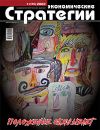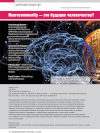Neurocommunity — the Future of Humanity?
DOI: https://doi.org/10.33917/es-5.185.2022.42-51
Neurodigital technologies qualitatively and quantitatively expand the possibilities of human behavior control, creating conditions for ensuring a targeted cognitive-psychological state of both an individual and groups within a neurocommunity. One of the key vectors for applying such new management opportunities is imprinting on a person of a positive perception of the surrounding reality, which contributes to maintaining socio-political stability in the state and society and also increases the efficiency of individual employees and their teams. Identification of psychosemantic qualities of a person based on analysis of his interests and preferences allows to form and imprint a cognitive-reflexive model of identification and interpretation of what is happening, adapted to a particular person, which serves as a source of actions for person and groups of his like-minded people and provides stability of the society, which is gradually acquiring the features of a neurocommunity.
References:
1. Vannevar Bush. As We May Think. The Atlantic, available at: https://www.theatlantic.com/magazine/archive/1945/07/as-we-may-think/303881/?single_page=true.
2. Ageev A.I. Golovokruzhenie intellekta [Intelligence Dizziness]. Ekonomicheskie strategii, 2019, no 5 (163), p. 5, available at: DOI: https://doi.org/10.33917/es-5.163.2019.5.
3. Denisov A.A., Sablin V.A. Rezul’taty aprobatsii sistemy upravleniya v postindustrial’nykh tekhnologicheskikh sredakh [Results of the Control System Approbation in Post-industrial Technological Environments]. Mezhdunarodnyi nauchno-issledovatel’skii zhurnal “Evraziiskii soyuz uchenykh”, 2020, no 10 (79), pp. 16–21. (Seriya: Tekhnicheskie nauki.)
4. Lepskii V.E. Problema sborki sub”ektov v informatsionnykh voinakh [Problem of the Subjects Assembly in Information Wars]. Informatsionnye voiny, 2019, no 4 (52), pp. 2–8.
5. Loginov E.L. Ispol’zovanie tekhnologii BIG DATA dlya protivodeistviya massovym besporyadkam v usloviyakh nedostatka informatsii i neopredelennosti razvitiya situatsii [Using BIG DATA Technologies to Counter Riots in the Face of Lack of Information and Uncertainty of the Situation Development]. Iskusstvennyi intellekt (bol’shie dannye) na sluzhbe politsii: Sb. statei mezhdunarodnoi nauchno-prakticheskoi konferentsii [Artificial Intelligence (Big Data) in the Police Service: Collection of Articles of the International Scientific-practical Conference]. Moscow, Akademiya upravleniya MVD Rossii, 2020, pp. 145–150.
6. Ageev A.I., Loginov E.L., Shkuta A.A. Kitai kak neiroinformatsionnaya megamatritsa: tsifrovye tekhnologii strukturirovaniya kognitivnykh ansamblei poryadka [China as a Neural-Information Megamatrix: Digital Technologies for Structuring Cognitive Ensembles of Order]. Ekonomicheskie strategii, 2021, no 1 (175), pp. 50–61, available at: DOI: https://doi.org/10.33917/es-1.175.2021.50-61.
7. Raikov A.N. Komp’yuternaya podderzhka refleksivnykh protsessov v upravlenii [Computer Support for Reflexive Processes in Management]. Sb. “Psikhologiya i ee prilozheniya” [Psychology and Its Applications]. Ezhegodnik Rossiiskogo psikhologicheskogo obshchestva, 2002, no 1, p. 52.
8. Loginov E.L., Shkuta A.A., Loginova V.E., Momotova A.K. Podkhody k kontsentratsii vnimaniya cheloveka i tselevoi aktivatsii sil’noi emotsional’noi reaktsii v novykh cheloveko-mashinnykh sistemakh, opirayushchikhsya na neirointerfeis “mozg — komp’yuter” [Approaches to Concentration of Human Attention and the Targeted Activation of a Strong Emotional Response in New Human-machine Systems Based on the Brain-computer Neurointerface]. Novye tekhnologicheskie vyzovy: problemy tsifrovoi transformatsii sistem upravleniya: Materialy mezhdunarodnoi konferentsii [New Technological Challenges: Problems of Control Systems Digital Transformation: Proceedings of the International Conference]. Pod red. A.I. Ageeva. Moscow, MNIIPU, 2019, pp. 37, 38.
9. Ageev A.I., Loginov E.L., Shkuta A.A., Momotova A.K. Modeling-nooning v menedzhmente lichnosti: formirovanie funktsional’nykh elementov neirokognitivnykh kommunikatsii v supersisteme “chelovek — info-kommunikatsionnaya sreda — gosudarstvo” [Modeling-Nooning in Personality Management: Forming Functional Elements of Neurocognitive Communications in the “Man — Info-Communication Environment — State” Supersystem]. Vestnik TsEMI, 2020, no 1, p. 11.
10. Grigor’eva E.A., Pevzner A.A., D’yakonov A.L. Metody perestroiki bioelektricheskoi aktivnosti mozga s tsel’yu ustraneniya patologicheski ustoichivogo sostoyaniya [Methods for Reorganizing Bioelectric Activity of the Brain in Order to Eliminate a Pathologically Stable State]. Doktor.Ru, 2013, no 5 (83), pp. 99–105.
11. Kudrin R.A., Lifanova E.V., Mironova Yu.V. Tipologicheskie osobennosti intellekta i bioelektricheskoi aktivnosti golovnogo mozga u lits, sklonnykh k riskovannomu povedeniyu [Typological Features of Intelligence and Bioelectrical Activity of the Brain in Individuals Prone to Risky Behaviour]. Vestnik Volgogradskogo gosudarstvennogo meditsinskogo universiteta, 2014, no 3 (51), pp. 62–64.
12. Ageev A.I., Loginov E.L., Shkuta A.A. Konvergentnyi monitoring i programmirovanie lichnosti kak instrument operirovaniya intellektual’noi dinamikoi povedeniya bol’shikh grupp lyudei [Convergent Monitoring and Programming of Personality as a Tool for Managing Intellectual Dynamics of Behavioral Activity of Large Groups of People]. Ekonomicheskie strategii, 2018, no 2 (152), pp. 70–87.
13. Ageev A.I., Loginov E.L., Shkuta A.A. Neiroupravlenie: konvergentnaya integratsiya chelovecheskogo mozga i iskusstvennogo intellekta [Neuromanagement: Convergent Integration of the Human Brain and Artificial Intelligence]. Ekonomicheskie strategii, 2020, no 6 (172), pp. 46–57, available at: DOI: https://doi.org/10.33917/es-6.172.2020.46-57.
14. Razrabotka osnov metrologicheskogo obespecheniya konstruirovaniya abstraktnykh soznanii dlya modelirovaniya i upravleniya sotsiumami: Otchet po NIR. Tema N 34.1 [Developing the Basics of Metrological Support for Construction of Abstract Consciousnesses for Modeling and Managing Societies: Research Report. Topic #34.1]. Rukovoditel’: k.t.n. A.A. Denisov. Moscow, Institut konstruktorsko-tekhnologicheskoi informatiki RAN, 2015, 85 p.
15. Raikov A.N., Ermakov A.N., Merkulov A.A. Verifikatsiya i sintez kognitivnykh modelei na osnove analiza bol’shikh dannykh [Verification and Synthesis of Cognitive Models Based on Big Data Analysis]. Svidetel’stvo o registratsii programmy dlya EVM RU 2019661809, 09.09.2019. Zayavka N 2019660498 ot 26.08.2019.
16. Smirnov I., Beznosyuk E., Zhuravlev A. Psikhotekhnologii: Komp’yuternyi psikhosemanticheskii analiz i psikhokorrektsiya na neosoznavaemom urovne [Psychotechnologies: Computer Psychosemantic Analysis and Psychocorrection at the Unconscious Level]. Moscow, Progress — Kul’tura, 1995, 416 p.
17. Lepskii V.E. Sistema ontologii samorazvivayushchikhsya polisub”ektnykh sred gibridnoi real’nosti [Ontology System of Self-developing Polysubject Environments of Hybrid Reality]. Upravlenie razvitiem krupnomasshtabnykh sistem MLSD’2019: Materialy XII Mezhdunarodnoi konferentsii [Development Management of Large-scale MLSD’2019 Systems: Materials of the XII International Conference]. Moscow, IPU RAN, 2019, pp. 1249–1251.
18. Shumskii S.A. Mashinnyi intellekt. Ocherki po teorii mashinnogo obucheniya i iskusstvennogo intellekta [Machine Intelligence. Essays on the Theory of Machine Learning and Artificial Intelligence]. Moscow, RIOR, 2019, 340 p.
19. Emotsional’nyi intellect [Emotional Intelligence]. Ruk.: Sergienko E.A., Vetrova I.I. Institut psikhologii RAN, available at: http://www.ipras.ru/cntnt/rus/institut_p/nauchnopra.html.
20. Metodika “Moral’nye dilemmy svoi — chuzhoi”. Mezhgruppovye urovni s parallel’noi registratsiei psikhofiziologicheskikh pokazatelei [“Moral Dilemmas of “Friend-or-foe” Methodology. Intergroup Levels with Parallel Registration of Psychophysiological Indicators]. Ruk.: Sozinova I.M., Znamenskaya I.I., Arutyunova A.K., Krylov A.K., Aleksandrov Yu.I. Institut psikhologii RAN, available at: http://www.ipras.ru/cntnt/rus/institut_p/nauchnopra.html.
21. Metodika otsenki individual’nogo stilya samoregulyatsii funktsional’nogo sostoyaniya cheloveka [Methodology for Assessing the Individual Selfregulation Style of a Person’s Functional State]. Ruk.: Dikaya L.G., Shchedrov V.I. Institut psikhologii RAN, available at: http://www.ipras.ru/cntnt/rus/institut_p/nauchnopra.html.
22. Metodiki opredeleniya tipov lichnosti s raznoi udovletvorennost’yu zhizn’yu [Methods for Determining Personality Types with Different Life Satisfaction]. Ruk.: Savchenko T.N., Golovina G.M. Institut psikhologii RAN, available at: http://www.ipras.ru/cntnt/rus/institut_p/nauchnopra.html.
23. Ageev A.I., Loginov E.L., Golublev A.A. Spetsial’naya podgotovka kadrov v interesakh gosudarstvennykh vedomstv dlya vypolneniya osobo vazhnykh zadach v slozhnykh usloviyakh s kriticheskoi intellektual’noi i psikhologicheskoi nagruzkoi na sotrudnikov [Special Personnel Training in the Interests of Government Departments to Perform Critical Tasks in Difficult Conditions with a Critical Intellectual and Psychological Burden on Employees]. Novye tekhnologicheskie vyzovy: problemy tsifrovoi transformatsii sistem upravleniya: Materialy mezhdunarodnoi konferentsii [New Technological Challenges: Digital Transformation Problems of Control Systems: Proceedings of the International Conference]. Pod red. A.I. Ageeva. Moscow, MNIIPU, 2019, pp. 9–11.



